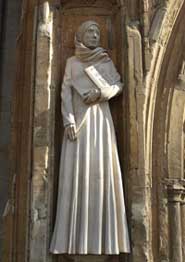Article #31
“All shall be well, and all manner of thing shall be well.” Julian of Norwich (<em>ca.</em> 1342–<em>ca.</em> 1416), in her <em>Showings.</em>

Julian of Norwich by David Holgate (Used by permission)
All shall be well
Julian of Norwich is an anchoress—a woman who has set herself apart for God and lives isolated in a cell. Like her contemporaries of 1373, she is Roman Catholic and believes that the last rites give special sanctifying grace and strengthen a sick person bodily and spiritually at death. Recognizing her need for a deeper love of Christ, she has appealed to God for three things:
• a stronger understanding of Christ’s passion
• a sickness unto death while still young, allowing her to experience all that a body and soul experience in death (including attack by devils and administration of the last rites) but without actual death—so that she might learn to live more mindful of God
• three “wounds:” absolute contrition, kind compassion, and steadfast longing toward God.
It seems her unusual prayer is being answered. Julian has indeed become deathly ill. Everyone around her despairs of her life. She also believes she is dying. The last rites are administered to her.
Then a wonderful thing happens: Julian experiences what a future generation might describe as a near-death experience. At the crisis of her sickness, between four and nine one afternoon, she receives fifteen “showings,” or revelations. She reports that heaven opens to her, she beholds Christ in his glory, and she sees the meaning and power of his sufferings. She also sees Christ’s mother, Mary, exalted and beloved.
In her thirteenth showing, Julian receives a comforting answer to a question that has long troubled her:
“In my folly, before this time I often wondered why, by the great foreseeing wisdom of God, the onset of sin was not prevented: for then, I thought, all should have been well. This impulse [of thought] was much to be avoided, but nevertheless I mourned and sorrowed because of it, without reason and discretion.
“But Jesus, who in this vision informed me of all that is needed by me, answered with these words and said: ‘It was necessary that there should be sin; but all shall be well, and all shall be well, and all manner of thing shall be well.'
“These words were said most tenderly, showing no manner of blame to me nor to any who shall be saved.”
In this she recognizes the compassion she had prayed for. She is impressed with her need to be joyful in all circumstances, however adverse, and for no particular reason, except this: that all things will ultimately be put right by Christ. She comes to such a sense of the awfulness of sin that she reckons the pains of hell are to be chosen in preference to it. Indeed, to one who recognizes the horror of sin, sin itself is hell. “And to me was shown no harder hell than sin. For a kind soul has no hell but sin.”
The following night Julian will receive a final, sixteenth showing while she sleeps. In it Satan and his hosts assail her, but God gives her grace, and she fixes her eyes on the crucified Christ and trusts that because of his suffering and victory over sin he can protect her, and he delivers her from the demonic jeers and mutterings.
She recovers to live thirty-three years longer. Soon after her recovery, Julian records a short account of her revelations. Twenty years after her visions, having meditated long upon them, she will add additional thoughts as to their meaning. Both the short and the long accounts will be widely disseminated in manuscript form and, after the invention of the printing press, will be published in many editions.
Centuries later, Christians will still read her Showings with interest and wonder to what extent Julian of Norwich actually penetrated the mysteries of the unseen world.
—Dan Graves
Dig a Little Deeper
- Deen, Edith. Great Women of the Christian Faith. New York: Harper, 1959.
- Gardner, Edmund G. “Juliana of Norwich.” The Catholic Encyclopedia. New York: Robert Appleton, 1914.
- Julian of Norwich. Revelations of Divine Love. Translated by Clifton Wolters. Penguin, 1966.
- Julian of Norwich. Showings. New York: Paulist Press, c1978.
- “Julian, of Norwich.” Dictionary of National Biography, edited by Leslie Stephen and Sidney Lee. London: Oxford University Press, 1921 – 1996.
Next articles
Article #32: Ignorant of the Scripture
John Wycliffe (ca. 1324–1384), from On the Truth of the Holy Scripture.
Article #33: Truth conquers all things
Jan Hus (ca. 1369–1415), in a letter to Christian of Prachatice
Article #34: The lesser of two evils
Thomas á Kempis (ca. 1380–1471), in The Imitation of Christ.
Article #35: Truth at a lower temperature
Philipp Melanchthon (1497–1560), at the Leipzig Debate.



